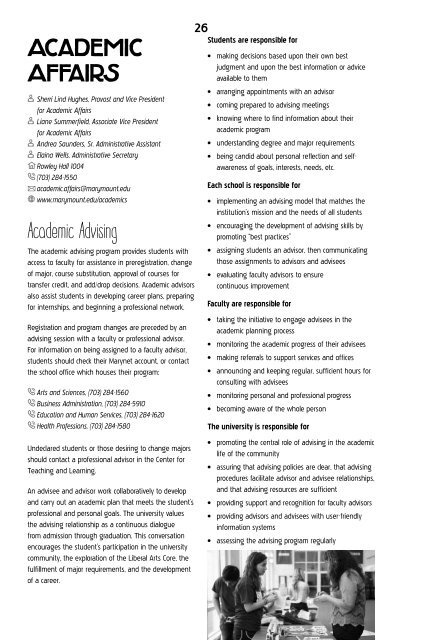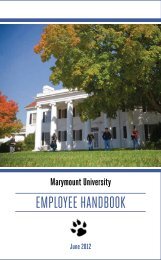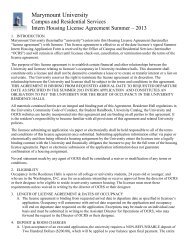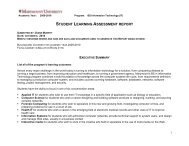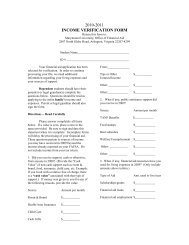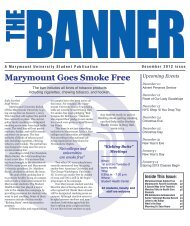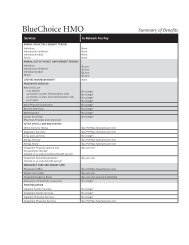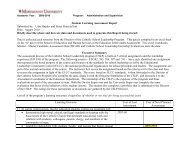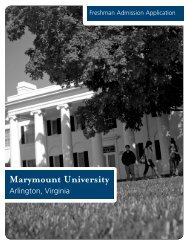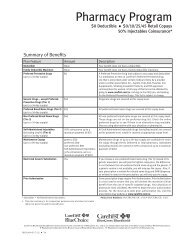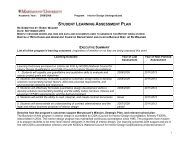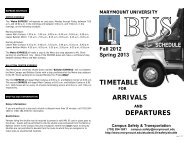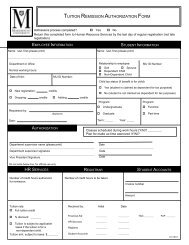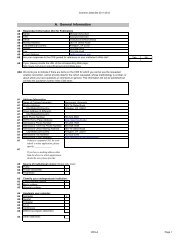Student Handbook - Marymount University
Student Handbook - Marymount University
Student Handbook - Marymount University
Create successful ePaper yourself
Turn your PDF publications into a flip-book with our unique Google optimized e-Paper software.
Academic<br />
Affairs<br />
99Sherri Lind Hughes, Provost and Vice President<br />
for Academic Affairs<br />
99Liane Summerfield, Associate Vice President<br />
for Academic Affairs<br />
99Andrea Saunders, Sr. Administrative Assistant<br />
99Elaina Wells, Administrative Secretary<br />
]Rowley ] Hall 1004<br />
[(703) [ 284-1550<br />
lacademic.affairs@marymount.edu<br />
l<br />
YYwww.marymount.edu/academics<br />
Academic Advising<br />
The academic advising program provides students with<br />
access to faculty for assistance in preregistration, change<br />
of major, course substitution, approval of courses for<br />
transfer credit, and add/drop decisions. Academic advisors<br />
also assist students in developing career plans, preparing<br />
for internships, and beginning a professional network.<br />
Registration and program changes are preceded by an<br />
advising session with a faculty or professional advisor.<br />
For information on being assigned to a faculty advisor,<br />
students should check their Marynet account, or contact<br />
the school office which houses their program:<br />
[Arts [ and Sciences, (703) 284-1560<br />
[Business [ Administration, (703) 284-5910<br />
[Education [ and Human Services, (703) 284-1620<br />
[Health [ Professions, (703) 284-1580<br />
Undeclared students or those desiring to change majors<br />
should contact a professional advisor in the Center for<br />
Teaching and Learning.<br />
An advisee and advisor work collaboratively to develop<br />
and carry out an academic plan that meets the student’s<br />
professional and personal goals. The university values<br />
the advising relationship as a continuous dialogue<br />
from admission through graduation. This conversation<br />
encourages the student’s participation in the university<br />
community, the exploration of the Liberal Arts Core, the<br />
fulfillment of major requirements, and the development<br />
of a career.<br />
26<br />
<strong>Student</strong>s are responsible for<br />
• making decisions based upon their own best<br />
judgment and upon the best information or advice<br />
available to them<br />
• arranging appointments with an advisor<br />
• coming prepared to advising meetings<br />
• knowing where to find information about their<br />
academic program<br />
• understanding degree and major requirements<br />
• being candid about personal reflection and selfawareness<br />
of goals, interests, needs, etc.<br />
Each school is responsible for<br />
• implementing an advising model that matches the<br />
institution’s mission and the needs of all students<br />
• encouraging the development of advising skills by<br />
promoting “best practices”<br />
• assigning students an advisor, then communicating<br />
those assignments to advisors and advisees<br />
• evaluating faculty advisors to ensure<br />
continuous improvement<br />
Faculty are responsible for<br />
• taking the initiative to engage advisees in the<br />
academic planning process<br />
• monitoring the academic progress of their advisees<br />
• making referrals to support services and offices<br />
• announcing and keeping regular, sufficient hours for<br />
consulting with advisees<br />
• monitoring personal and professional progress<br />
• becoming aware of the whole person<br />
The university is responsible for<br />
• promoting the central role of advising in the academic<br />
life of the community<br />
• assuring that advising policies are clear, that advising<br />
procedures facilitate advisor and advisee relationships,<br />
and that advising resources are sufficient<br />
• providing support and recognition for faculty advisors<br />
• providing advisors and advisees with user-friendly<br />
information systems<br />
• assessing the advising program regularly


